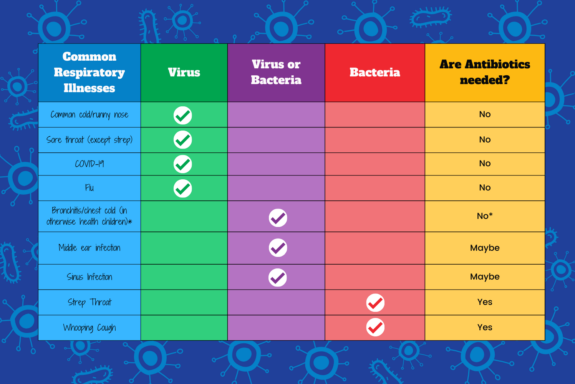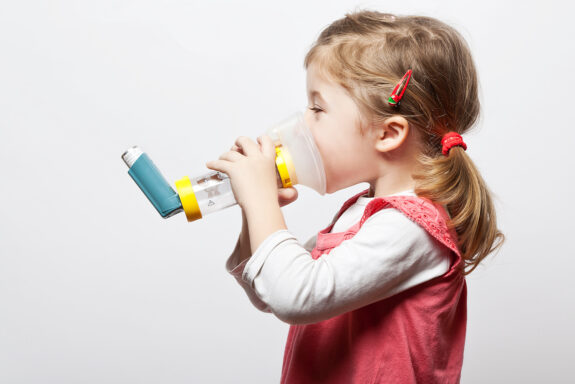

What is asthma?
Asthma is a chronic (long-lasting) lung disease in which the lining of the airways of the lungs is often swollen or inflamed. Asthmatic airways are also unusually sensitive to certain irritants or “triggers.” An asthma trigger can be something your child is allergic to such as pollen, animal dander, or house dust. A trigger can also be an irritant such as tobacco smoke, menthol vapors, cold air, or a cold virus. When the airways react to a trigger, the muscles around the airways tighten and the lining of the airways swells and produces thick mucus. This causes the airway to narrow and makes it harder to breathe. This breathing difficulty is called an asthma attack. An asthma attack can be mild, moderate, or severe. When your child is having an attack, he will usually need to take medicine to relieve the symptoms. If your child has frequent asthma attacks he may need to use medicines every day to better control his asthma.
Asthma does not go away when your child is not having symptoms. The airways are still inflamed. Your child needs to have a treatment plan, called an Asthma Action Plan, and close follow-up by a healthcare provider.
What are the symptoms?
Symptoms of asthma may come and go. Asthma symptoms may include any combination of:
- repeated coughing, especially at night or the early morning, with exercise, or with viral infections such as colds
- wheezing (a high pitched whistling sound heard during breathing)
- trouble breathing
- new or increased reluctance to participate in vigorous play or activities requiring physical exertion
Other severe symptoms in children are:
- blue or gray lips or fingernails (Call 911.)
- flared nostrils when trying to breathe in
- speaking in short sentences or phrases only
- sinking of skin or muscles between the ribs or the notch at the base of the throat when breathing in unusual paleness or sweating
- trouble walking or playing
- hunching over or struggling to breathe
- starts coughing and can’t stop.
How long does it last?
Some children may have asthma symptoms for a few years and then grow out of it. Asthma symptoms often improve during the teenage years. For most children, however, asthma remains active all their lives. Asthma attacks last from minutes to days depending upon the trigger. They may be frightening, but are treatable. When medicines are taken as directed, the symptoms can be controlled or completely cleared up.
What type of medicine does my child need?
Quick-relief medicine, or relievers:
Quick-relief medicines, also called relievers or rescue medicines, quickly open your child’s airways and are used when your child is having an asthma attack. These medicines are called bronchodilators.
If your child is having asthma symptoms (wheezing, coughing, trouble breathing), he should take his quick-relief medicine. If you have any doubt about whether or not your child is wheezing, have your child take his quick-relief medicine. The longer he waits to take his medicine, the longer it takes to stop the wheezing. Once treatment with the medicine is begun, keep giving your child the quick-relief medicine according to the dose prescribed by your healthcare provider. (Your child may need to take the quick-relief medicine for several days.) Caution: if the inhaler hasn’t been used in over 7 days or is new, test spray it twice into the air before using it for treatment.
Long-term control medicines, also called controllers, help prevent asthma attacks. These medicines keep the airways in your child’s lungs from getting inflamed and irritated. Inhaled steroids are one type of frequently used controller medicine. They are considered the most effective long-term therapy for patients with chronic asthma. Although some children with asthma may not need a long-term controller medicine in addition to quick-relief medicines during asthma attacks, many do.
Children with the following symptoms usually need to take long-term control medicines every day to allow them to participate in normal activities:
- asthma symptoms on more than 2 days a week
- needing to use a quick-relief medicine more than 2 days a week (other than to prevent exercise-induced symptoms)
- 2 or more nighttime attacks a month
- needing treatment with oral steroids 2 or more times a year
- asthma triggered by pollens (may need to use a long-term control medicine daily during the pollen season).
How can I take care of my child?
- Hay fever. For hay fever symptoms, it’s OK to give antihistamines. Poor control of hay fever can make asthma attacks worse. Research has shown that antihistamines don’t make asthma worse and may improve asthma control.
- Colds. Most children with asthma wheeze when they get coughs and colds. If this is true for your child, give your child his quick-relief asthma medicine at the first sign of any coughing or wheezing. The best “cough medicine” for a person with asthma is an asthma medicine, not a cough syrup. Watch your child carefully when he has a cough or cold and call your healthcare provider for advice if he is not improving after taking asthma medicine or if the symptoms are getting worse.
- Exercise. Most people with asthma get short attacks of coughing and wheezing when they exercise strenuously. Prolonged vigorous exercise such as long distance running, especially in cold air, is a major trigger. Crying and temper tantrums may also trigger an asthma attack in very young children. If your child has exercise induced asthma, let coaches, teachers, or others who supervise your child’s activities know what to do to help your child. Exercise and other physical activities do not need to be avoided. If your child is recovering from a viral illness, he may need to avoid gym class or sports for a short time. Your child can usually prevent symptoms by using a quick-relief medicine 15 to 30 minutes before exercise. If your child still has a lot of symptoms with exercise even after using a quick relief medicine, talk with his healthcare provider.
- Going to school. Asthma is not contagious. Your child should go to school if he is having mild asthma symptoms, but should avoid gym or vigorous activity on these days. Arrange to have the asthma medicines, a peak flow meter, and an Asthma Action Plan at school. The Asthma Action Plan should be developed with your healthcare provider and outline what to do if your child has asthma symptoms while at school. If your child can’t go to school because of asthma, take him to your healthcare provider that same day for advice about additional treatment.
- Common mistakes. The most common mistake is delaying the start of prescribed asthma medicines or not replacing them when they run out. Nonprescription inhalers and medicines are not helpful.
Another serious error is continuing to expose your child to an avoidable cause of asthma. For example, do not keep a cat if your child is allergic to it. Also, do not allow smoking in your home. Tobacco smoke can linger in the air for more than a week.
When your child is having an asthma attack, don’t panic. Fear can make trouble breathing worse, so try to remain calm and reassure your child. Finally, try not to let asthma restrict your child’s activities, sports, or social life. If your child’s asthma symptoms are worsening and affecting his lifestyle make an appointment to discuss your concerns with your healthcare provider. A change or increase in asthma medicines may be necessary to gain better control of your child’s asthma.
How can asthma attacks be prevented?
- Try to discover and avoid the substances that trigger your child’s asthma attacks. Second-hand tobacco smoke is a common trigger. If someone in your household smokes, your child will have more asthma attacks, take more medicine, and need more emergency room visits.
- Remove pets from the home or try to keep them outdoors or at least out of your child’s room.
- Learn how to dust-proof your child’s bedroom. Change the filters on your hot-air heating system or air conditioner at least monthly.
- For allergies to molds or dust mites, try to keep humidity in the house between 30 and 50%. Use a dehumidifier if necessary.
- If your child wheezes after contact with grass, weeds, or animals, there may be pollen or animal dander remaining in your child’s hair or on his clothes. Your child should shower, wash his hair, and put on clean clothes.
- Your child should get the flu vaccine each fall.
- Keep your child’s Asthma Action Plan, peak flow meter, and medicines handy at all times. This plan is developed with your healthcare provider and outlines what to do when your child has asthma symptoms.
When should I call my child’s healthcare provider?
Call IMMEDIATELY if your child:
- has severe wheezing
- is having trouble breathing
- has wheezing that has not improved after the second dose of quick-relief asthma medicine
- has a peak flow rate of 50% or less of the personal best.
Call during office hours if:
- The wheezing lasts more than 24 hours with treatment.
- Your child does not have an Asthma Action Plan.
- You have other questions or concerns.
Disclaimer
Written by Barton D. Schmitt, MD, author of “My Child Is Sick”, American Academy of Pediatrics Books.
Pediatric Advisor 2012.1 published by RelayHealth.
Last modified: 2011-07-28 Last reviewed: 2010-12-13
This content is reviewed periodically and is subject to change as new health information becomes available. The information is intended to inform and educate and is not a replacement for medical evaluation, advice, diagnosis or treatment by a healthcare professional.
© 2012 RelayHealth and/or its affiliates. All rights reserved.
Merck does not endorse and is not responsible for the accuracy of the content, or for practices or standards of non-Merck sources. Please read our Terms of Use for more information.
Copyright © 2012 Merck Sharp & Dohme Corp., a subsidiary of Merck & Co. Inc. All rights reserved.
The Lancet® is a registered trademark of Elsevier Properties S.A. used under license.



